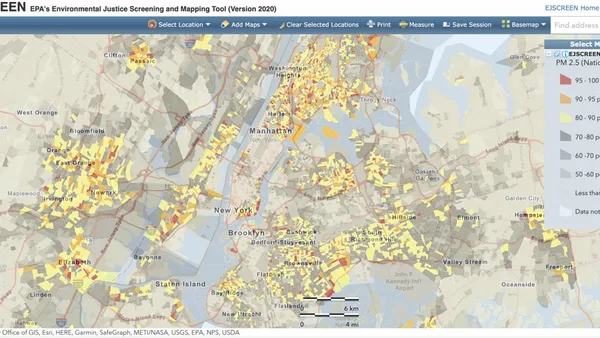Dive Brief:
- Companies that fail to make progress on environmental, social and governance (ESG) goals may end up excluded from consideration by many investors, Larry Wieseneck, Cowen co-president, told an online conference for chief financial officers sponsored by the American Institute of CPAs.
- “If you’re not moving forward on things like the environment, you’ll be uninvestable in certain parts of the investor universe,” Wieseneck said, predicting that all Wall Street research within 12 months will include “an ESG score — it’s just becoming too important to investors.”
- “We think ESG is bigger than anyone realizes,” he said, adding that during “the last few years it’s accelerated enormously quickly."
Dive Insight:
Corporate reporting and disclosure on ESG metrics has surged during the past decade, according to the Governance & Accountability Institute.
Nine out of 10 companies in the Standard & Poor’s 500 released sustainability reports in 2019 compared with just two out of 10 in 2011, the Institute said.
“Corporate reporting now has permanently expanded to include” ESG performance, Robert Hirth, co-vice chair of the Sustainability Accounting Standards Board, told the conference for CFOs.
“There’s absolutely an increased demand for this reporting,” Hirth said, predicting that eventually “every publicly listed company will more than likely report some form of ESG information.”
The Securities and Exchange Commission (SEC) and regulators in many countries are urging more disclosure. Since the start of the Biden administration in January, the SEC has sharpened its focus on ESG matters across its oversight and operations.
The SEC examinations division mentioned climate-related risks first in its description of priorities for 2021, and the agency's corporation finance division plans to give more attention to climate-related disclosure.
The SEC's enforcement division in March announced the creation of a climate and ESG task force made up of 22 members from SEC headquarters, including the whistleblower's office, as well as regional offices and “specialized units” within the division.
Strong ESG performance can reduce a company’s cost of capital, improve operations and boost share valuation, Hirth said, urging executives “not to look at this as a cost.”
“You’ve got to tell your story at the end of the day to attract your investors and satisfy your individual stakeholders,’” he said. “This is a way to focus on some factors that make you a better company, that reduce risk, that make you more attractive to customers, more attractive to employees and gives you a better supply chain.”















